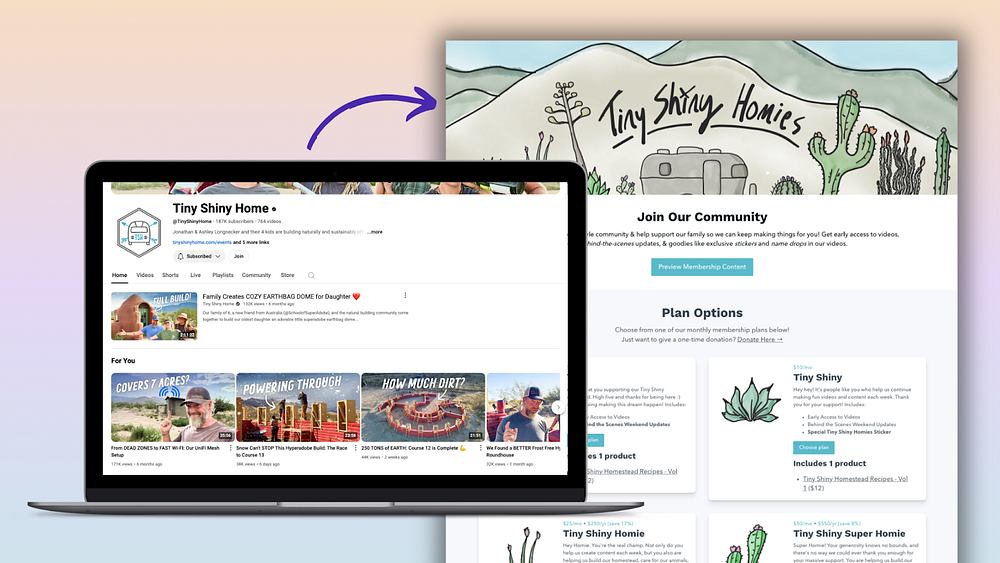Struggling to get your first few customers in the door?
I feel you. I’ve been there.
It’s hard. Soul-crushing, even.
But when you get to the other side -- the side past your first 100 customers?
That’s everything. Financially and otherwise.
Today, I’ll teach you the strategies I used to get there and how to land not just your first 100 customers, but the many that will follow after them.
But before we get into that, let’s take a quick step back and look at what’s stopping you from getting there in the first place.
(P.S.: Prefer a visual approach? Hop down to the bottom of this page for an infographic walkthrough.)
The biggest challenge standing in most creators’ way
What's the biggest Achilles' heel for most creators like yourself? Usually, it’s marketing.
And who can blame you? Marketing can be tedious and make you feel out of your depth.
There are so many strategies you can try (build links to your website, create infographics, try email marketing, run social media ads, etc.) and not enough time, money, or both.
When it comes to marketing, you probably have one or all of these concerns:
-
I’m a creator, not a marketer!
-
I really don’t have a marketing budget
-
There are so many marketing strategies, which one do I even pick?
And I get it. With so many marketing strategies out there, which one do you go with? Which strategies cost little-to-no money to execute when you don’t have money to begin with?
Well, I’ve got some good news for you.
The marketing strategies I’m going to share won’t require you to have a marketing plan, cost you an arm and leg, or be too difficult to execute. The only thing you need is a “get stuff done!” attitude.
These strategies may not be as scalable or have massive potential like paid advertising or SEO do, but they’re free, simple, and designed to work, especially during the early days of your online business.
I’ve tested the strategies I’m about to share to get ~300 new email subscribers for Mapplinks Academy, many of whom turned into paying students, agency clients, and even some of our biggest fans online.
I also used these strategies to identify our target customers, where they hang out, and what their pain points are to drive trial signups for a fairly new floral estimate software out of New York.
So whether you’re selling an ebook on how to lose weight, a membership site that teaches members how to start their career as a freelancer, or an online course that teaches students web development, you can reach your first 100 customers and more by following this step-by-step guide.
With that out of the way, let’s get started, shall we?
Marketing strategy #1: Reddit
Reddit is a place where you’ll find like-minded people in tightly knit communities tied around a topic, theme, or niche.
For the uninitiated who don’t know what Reddit is or don’t care enough to find out -- ignore it at your own peril. Reddit could perhaps be the best place to land your first 100 customers.
But don’t take my word for it.
Reddit is ranked #6 for top sites in the United States according to Alexa rankings (and #18 in top sites in the world!).
So now that I have (hopefully) done a decent job at convincing you why Reddit shouldn’t be ignored, what can marketing on Reddit do for you?
Well, Reddit can help you with the following:
-
Find early adopters for your product/service
-
Get great feedback from other Redditors (who might become your customers)
-
Find out which kind of people are most receptive to your offering
Basically, whether it’s understanding your target audience better, getting customer feedback, or even simply driving signups, Reddit has you covered.
How do you make Reddit work for you? Here’s a simple five-step guide:
-
Identify and make a list of 10-15 subreddits relevant to your product/service; join them.
-
Start engaging in a conversation with other Redditors on these subreddits. Comment on their threads, upvote their posts, and focus on adding value to these subreddits.
-
Spend a few days observing these subreddits to see which kind of content gets upvoted and identify which kinds of posts you can contribute something valuable to.
-
Post on these subreddits about what you’re selling either as a post or indirectly reference your product in reply to another post.
-
Make sure you frame it in a way that doesn’t make it sound heavily promotional. Start with a “Hey Redditors, here’s what I’m working on...” or “Looking to get some feedback.” Redditors can smell self-promo from a mile away, so be careful here.
For example: when I was looking to drive email signups to our free growth hacking course on Reddit, here’s what we did:
-
Identified a list of subreddits where our ideal buyer/target audience most likely hangs out (for us, it was subreddits like r/growthhacking, r/startups, r/growmybusiness, r/SideProjects, etc.).
-
We genuinely engaged with other Redditors on these subreddits, be it through upvotes, comments, sharing marketing tips, or even giving feedback on their ideas.
-
We gently introduced what we were selling by posting on those subreddits directly or by linking to our email course indirectly as an answer to somebody’s question.
-
Rinsed and repeated.
The result: We gained ~45 email subscribers to our free course. Not too shabby considering we got those signups for free.
Caveat: Reddit can be a cruel and unforgiving place, especially for self-serving people. Redditors despise blatant self-promotion and will call you out, downvote you, or even ban you from subreddits.
To prevent getting called out or banned, make sure you comply with the rules of individual subreddits, contribute value to discussions, and also ensure you’re gently promoting what you’re doing in the right places.
I usually follow this rule when it comes to Reddit marketing: Give 3 times, ask once.
Further reading: Reddit marketing - How to self-promote on Reddit and get more traffic
Marketing strategy #2: Quora
(Source)
Quora is a powerful Q&A platform that has massive potential, especially if you’re in a small niche. And with an estimated ~80 million visitors per month (based on January 2020 Ahrefs data), it has a huge audience you can leverage with relative ease.
Quora questions also rank on Google’s first page for various keywords, which makes it a goldmine for anyone looking to work their way into Google’s SERPs without doing any heavy-duty SEO work of writing keyword-focused content, building links, and getting it to rank.
Here’s how to make Quora work:
-
Find questions people are asking on the platform related to the solution you’re offering.
-
Answer those questions and give as much detail as needed (but not too much detail).
-
Gently introduce your product and how it alleviates their pain points as a link within the answer.
For example, if I were to promote the same growth hacking course from before, I would search Quora for the term “growth hacking”. Here’s a question that comes up:
The next step is writing a great answer that’s at least 2-3x times better than the other answers. What I mean by that is to give away tons of value in your answer such that the reader wants to learn more about you and what you’re doing.
This is where your expertise comes in. So answer the question, be argumentative and critical, give enough detail but not too much because, at the end of the day, you want people to buy what you created.
A good rule of thumb when answering a question is to give enough detail that leaves your reader wanting more. Include a link to your product with a CTA directing readers where they can go to learn more, and that’s it.
Obviously, like our Reddit example above, try to be subtle with the CTA and self-promotion.
Answer Quora questions 2-3x per week, and you should start seeing traffic and signups within no time. It really only takes 5 minutes per question.
Here’s an example of a good answer to the question, “What is growth hacker marketing?”:
Quora marketing, if done right, can lead to some quick wins in terms of driving trial signups, traffic back to your website, or even building your brand awareness.
Here are some more ways to discover potential questions to answer on Quora:
-
Do Google searches for questions your target consumer might have about your product or area of expertise.
-
Follow individual topics within Quora that relate to what you’re doing.
-
Answer those related questions on Quora.
In my instance, I also followed the topic of “growth hacking” to find great questions to answer. On the right-hand bar, highlighted above, you’ll also see questions related to what you searched for.
The result: ~70 email signups to our free email course in 4 weeks. These same email signups then converted into paying customers, agency clients, and even some raving fans.
We also turned this experiment into an ebook to give away to email subscribers, resulting in greater thought leadership in the marketing space, plus paying students as well as clients looking to us to replicate our Quora success for them.
Further reading: Quora Marketing - A guide to get more from your efforts
Marketing strategy #3: Twitter’s advanced search
Twitter’s Advanced Search is a tool Twitter offers that allows you to granularly search for tweets based on various criteria like location, keywords, hashtags, etc.
While the advanced search tool had its own page before, it now shows up within Twitter’s feed. Here’s what Twitter’s advanced search looks like:
The beauty of Twitter’s advanced search is that it allows you to zero-in on your ideal customers using hashtags, exact phrase match queries, and even go as narrow as the time or locations of the tweets.
Here’s how you use Twitter’s advanced search:
-
Think about the problem your product solves. For example, you have a course that helps people learn new makeup techniques.
-
Enter queries like “need new makeup,” “looking for makeup advice,” or “any new makeup ideas” in Twitter’s advanced search.
-
Get a list of tweets, look at them to spot patterns such as hashtags or keywords used. You can use this to get even better at searching later.
-
Reply to relevant tweets. Add value to the discussion and gently plug your product at the end.
I tested this strategy while freelancing for a new floral software program out of New York. I used Twitter advanced search to gain insights into customer pain points, user personas, and etc. to understand what florists on Twitter were tweeting about.
But I also used Twitter to land new trial customers. Here’s how.
If I use advanced search to find who used the hashtag “#florists” in New York, here is one result I come up with:
If there are two things I’d change about this tweet now, I’d probably add more value to the conversation (instead of just a lousy emoji) and make the tweet sound less promotional.
While this strategy didn’t drive great results for me, it heavily depends on what type of niche you’re in and who you’re targeting.
A great example of a niche Twitter could work for is from the guys at Oberlo who used “need new makeup” as an exact match search term and came up with the following queries:
As I stated earlier, If your online course teaches people new makeup techniques, tweeting to these people with a new makeup tip and a link to your online course could be the perfect strategy to drive some initial traction.
Why? There is clear intent, the tweets are recent, and the pain point is clear. And, look at the replies to their tweets. None.
Jackpot.
Setting up these custom alerts on Twitter and answering them 1-2x a week is guaranteed to generate some early traction for your creative online business.
The accompanying guide below will give you even more ideas on how to use Twitter Advanced Search to zero in on your ideal customers, find consumer pain points, and discover PR opportunities.
Further reading: How to use Twitter Advanced Search - The definitive guide
Bonus strategy #4: Give away free stuff
Getting someone to buy from you in your first interaction is difficult and unreasonable. People don’t know you, and hence they do not trust you. Yet.
The best way to drive sales is to first offer something to potential customers for free. For example:
-
If you have an in-depth course on growth hacking, create an email mini-course and give away content for free (such as the growth hacking email course we covered in this guide).
-
If you’re selling a premium ebook on how to become a freelancer, create a mini-ebook that talks about mistakes to avoid as a freelancer, and give this information away for free.
Rishabh, my old boss, did this really well. With free email courses and low-priced ebooks acting as lead magnets, his end goal is to have students buy the Growth Hacking Masterclass, which is his most in-depth training program and his most expensive offering.
The gist of it is:
Lowering the price of entry in the form of a free trial or a freebie (a mini course for example) massively improves your chances of driving free signups or trials (these people will likely buy from you once they see the value in what you’re offering).
Further reading: Should you give away free digital downloads? Definitely. Here's why.
Infographic: The definitive guide to landing your first 100 customers
Made by our friends at Venngage — the infographic & timeline maker.
Making money online isn’t impossible (and doesn’t have to be expensive)
As I said before, with so many marketing strategies to try, it’s not a question of, “I don’t know marketing” but more a question of, “Which marketing strategies do I try first?”
Here’s a recap of the various marketing strategies I outlined before and what you need to do to execute them:
-
Reddit. Engage in genuine discussions on subreddits and slowly introduce what you’re working on.
-
Quora. Answer questions related to your area of expertise or niche. Introduce your product and how it solves your customer’s problem.
-
Twitter Advanced Search. Use advanced Twitter search operators to discover who needs what you’re offering. And then give it to them.
I hope this guide gave you a simpler way to approach marketing your creative business.
Like any marketing strategy, there will come the point when they don't work anymore or as effectively as they used to.
If that happens with the strategies I shared here, pour into some more marketing blogs to find newer marketing ideas to test. Rinse and repeat until you land your first 100 customers.



